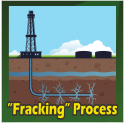PA "OK's" More Gas Drilling on State Game Lands
 HARRISBURG, Pa. — The Pennsylvania Game Commission has expanded the scope of
HARRISBURG, Pa. — The Pennsylvania Game Commission has expanded the scope of
leasing state-owned hunting lands for harvesting natural gas from the lucrative
Marcellus Shale formation, this time netting more than $18 million.
The money helps a financially strapped agency that has cut back programs,
such as raising pheasants for small-game hunting, while going a dozen years
without an increase in the hunting license fees that are its primary source of support.
About two-thirds of the lease money is payment for the extraction of natural
gas from beneath game lands in Bradford and Lycoming counties in northern
Pennsylvania by way of wells that would be drilled on adjacent, privately owned
land. Another lease on game lands in adjoining Tioga County will allow up to
three well pads — each of which can host multiple wells — and pipeline
construction.
Marcellus Shale drilling involves blasting chemical-laced water into the
ground, a procedure called hydraulic fracturing, or fracking. Critics say
fracking could poison water supplies, but the gas drilling industry says it's
been used safely for decades.
Ted Onufrak, president of the 90,000-member Pennsylvania Federation of
Sportsmen's Clubs, said most of his members are comfortable with the expansion
of Marcellus Shale drilling as long as the Legislature and governor's office
give the game commission the resources to stay on top of the activity.
"If you've got one (commission) land manager in charge of two counties, and
first there's 20 wells and then there's 60 wells, that's a lot to ride herd on,"
Onufrak said. "They are going to need some additional staff."
The new leases bring the agency's haul from the Marcellus Shale to at least
$19 million, game commission officials said. Royalties are also beginning to
trickle in from the first Marcellus Shale wells that are producing gas,
commission officials said.
The money stays with the game commission, which can use it to buy land or pay
for its day-to-day operations. A large chunk of the more than $300 million
raised by leasing Pennsylvania's state forest land for Marcellus Shale drilling
has been tapped by the Legislature to help wipe out state government
deficits.
The commission does not view gas drilling income as a replacement for the
lack of an increase in the $20.70 adult resident hunting license fee, which the
agency has sought from the Legislature since 2004, spokesman Jerry Feaser said
Wednesday.
Feaser also said the commission is not under additional pressure to lease
game land because of the Legislature's refusal to raise fees. He pointed out
that when the energy industry's pursuit of the Marcellus Shale began in earnest
in 2008, companies asked the commission to lease its entire land holdings in the
northeastern corner of the state, which it has not done.
"But again, we need to find a way of continuing to fund the programs and
projects that the public has come to expect from the game commission," Feaser
said.
The commission has a budget of about $81 million this year, although it
expects to spend less than that, Feaser said. It also has leased land in the
past for shallower oil and gas drilling that do not demand the huge volumes of
chemical-laden water that are pumped under high pressure into shale wells.
The vast Marcellus and Utica shale formations underneath Pennsylvania and New
York also extend beneath Ohio, which appears poised to follow suit as gas
drilling accelerates there.
Ohio Gov. John Kasich wants permission from the Legislature to allow natural
gas drilling in state forests, parks and wildlife areas, a spokeswoman said,
while excluding natural areas and preserves.
High-volume hydraulic fracturing in the Marcellus Shale region of New York
has been on hold since 2008 while state regulators complete an environmental
review and draft new permitting requirements. Gov. Andrew Cuomo's appointee to
head the state Department of Environmental Conservation, Joe Martens, has said
he won't allow fracking until rules are in place ensuring it is done safely.
In West Virginia, lawmakers have raised the possibility of reaping revenue
for the state treasury by allowing Marcellus Shale drilling in state forests. So
far, West Virginia has not leased any of its publicly owned forests or wildlife
areas for Marcellus Shale drilling, said Joe Scarberry, who manages the office
of land and streams for the West Virginia Division of Natural Resources.
However, the state does not own the below-ground gas rights for the majority
of that land, Scarberry said, and the drilling permits do not say whether the
drilling is for shallower gas deposits or the Marcellus Shale.
Most of the Marcellus Shale drilling on Pennsylvania's state game lands is on
tracts where the state does not own the below-ground gas rights.
Of the 43 Marcellus Shale wells drilled on the Pennsylvania game commission's
1.4 million acres, just 17 are on land where the agency owns the mineral rights,
commission officials said. There are probably more than 100 permits for drilling
wells on state game lands currently, meaning hundreds more wells are possible,
officials said.
Feaser said the commission has not done a comprehensive study on where and
how intensely drilling is environmentally acceptable on game lands. But, he
said, the game commission staff knows where sensitive wetlands, high-quality
streams and critical habitats are and will fight to protect those areas. The
commission is able to specify how it wants the drilling pads restored and
replanted, he said.
___ Associated Press writer Mary Esch in Albany, N.Y., contributed to this
report.
—Copyright 2011 Associated Press






